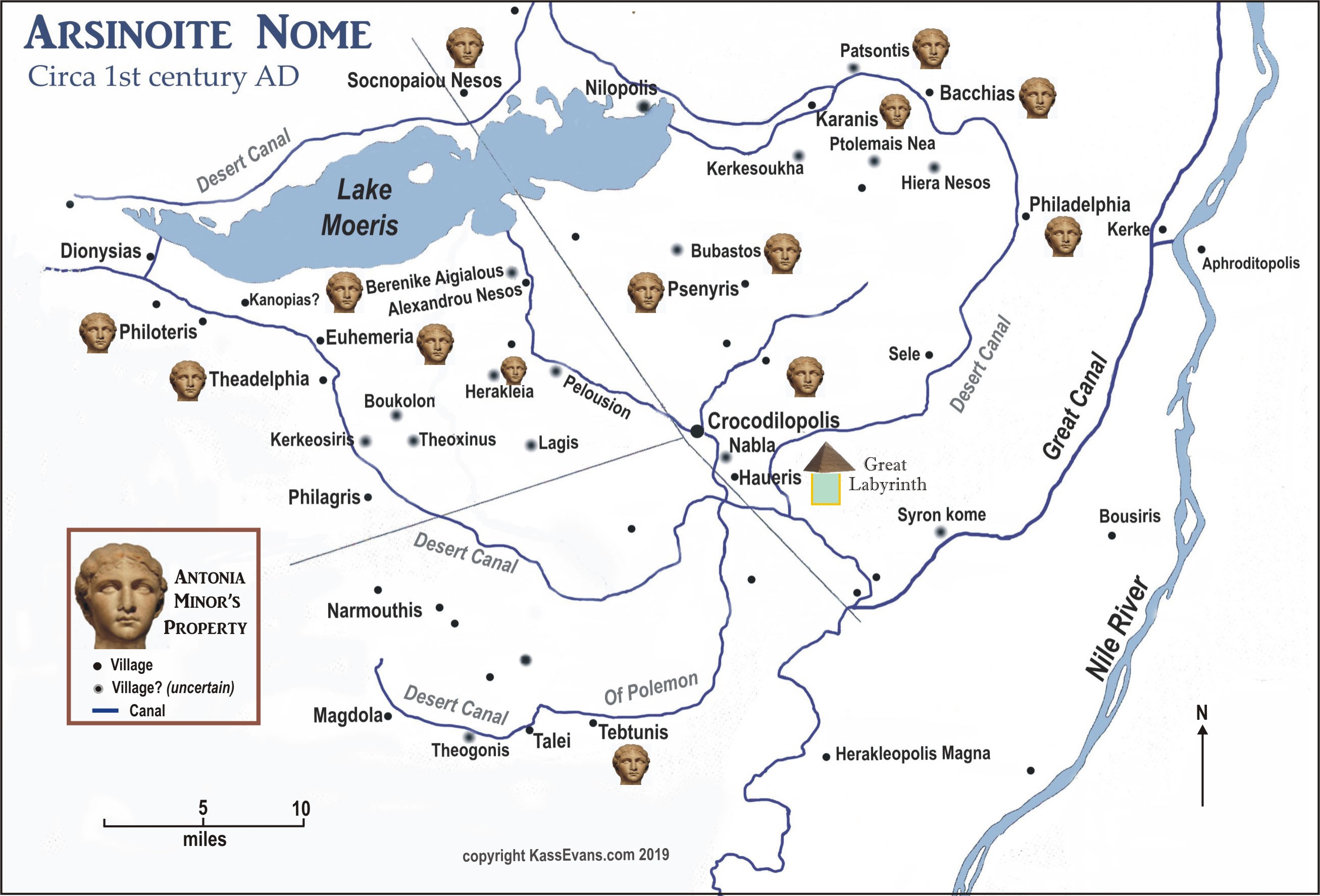  | |

Katherine "Kass" Evans, M.A., M.A., M.Ln., M.V.
| |
| Kass Evans Home Alexander Home Social World Family Scholarship Bibliography |
Alexander the Alabarch: Epitropos for the ousia of Antonia Minor | |||
|
As an absentee landlady, Antonia would have needed trusted persons on site to manage her extensive and scattered estates in Egypt, her ousia. It appears that this was managed by appointing the person known as Alexander the Alabarch as her official epitropos. There is no exact translation or definition, but it appears the epitropos was probably a type of procurator or governor that managed all parts of Antonia Minor's ousia. The source for Alexander's role as epitropos is Flavius Josephus Jewish Antiquities 19.276-277. No other source for the management of Antonia's ousia has survived. Under the the Egyptian pharaohs and later the Ptolemaic kings and queens, all land in Egypt was royal property. After Octavian (later Augustus) defeated Queen Cleopatra VII in 30 B.C., nearly all land in Egypt reverted to him.
Under Augustus, Egypt's land was parceled out in small lots that often were not contiguous. Exactly, how land was divided and distributed is unknown, but it appears likely that some parts were given out as gifts from Augustus, some parts were sold, and, of course, large parts were kept as imperial lands. The properties tended to be scattered with a wheat field in one village, a vinegard in another, and an olive grove or olive press in another village. Other properties may have been dedicated to husbandry of cows, sheep, goats, fowl and some were marshland for fishing.
The scattered properties as a collective were called by the Greek word ousia. Although this can be referred to as someone's "estate," that term doesn't quite capture the disparate nature of properties. It is known that a lot of buying, selling, and leasing of the ousiadid occur. It is likely that land transaction were for the purposed of combining contiguous tracts, say to make one big wheat field. It is also possible that some specialization occurred where someone would buy or lease lands that only were designated for wine, or some other specific product. It has been speculated that Queen Cleopatra VII may have granted lands to her consort Marcus Antonius. After his defeat, these lands may have passed to his daughters Antonia Major and Antonia Minor. Along with gifts from her uncle Augustus and private purchases, Antonia may have been one of the largest land owners in Egypt in the early first century A.D. It must be clear that there is no extant land register of Antonia Minor's properties. Everything she owned has been reconstructed by the random and serendipitous discovery of papyri that mention her and her properties. Since almost no papyri come from the Delta area and mmany come from the Fayum (ancient Arsinoite Nome), the most information is about the latter. Antonia may have owned a of property in the three Greek cities and in the Delta in general, but all evidence of that is lost. As an absentee landlady, Antonia would have needed trusted persons on site to manage her extensive and scattered estates, her ousia. It appears that this was managed by appointing the person known as Alexander the Alabarch as her official epitropos. There is no exact translation or definition, but it appears the epitropos was probably a type procurator or governor that managed all parts of Antonia Minor's ousia. Below is a graphic showing some (but not all) of the places where Antonia Minor owned property in the Arsinoite Nome around Lake Moeris. In some cases, she is explicitly identified as Antonia the wife of Drusus. In other places, only the name Antonia so it may refer to her older sister Antonia Major. There is no explicit evidence that Antonia Major ever held property in Roman Egypt. The ousia of Antonia Minor in the Arsinoite Nome, Egypt: Select Bibliography.
| |||
